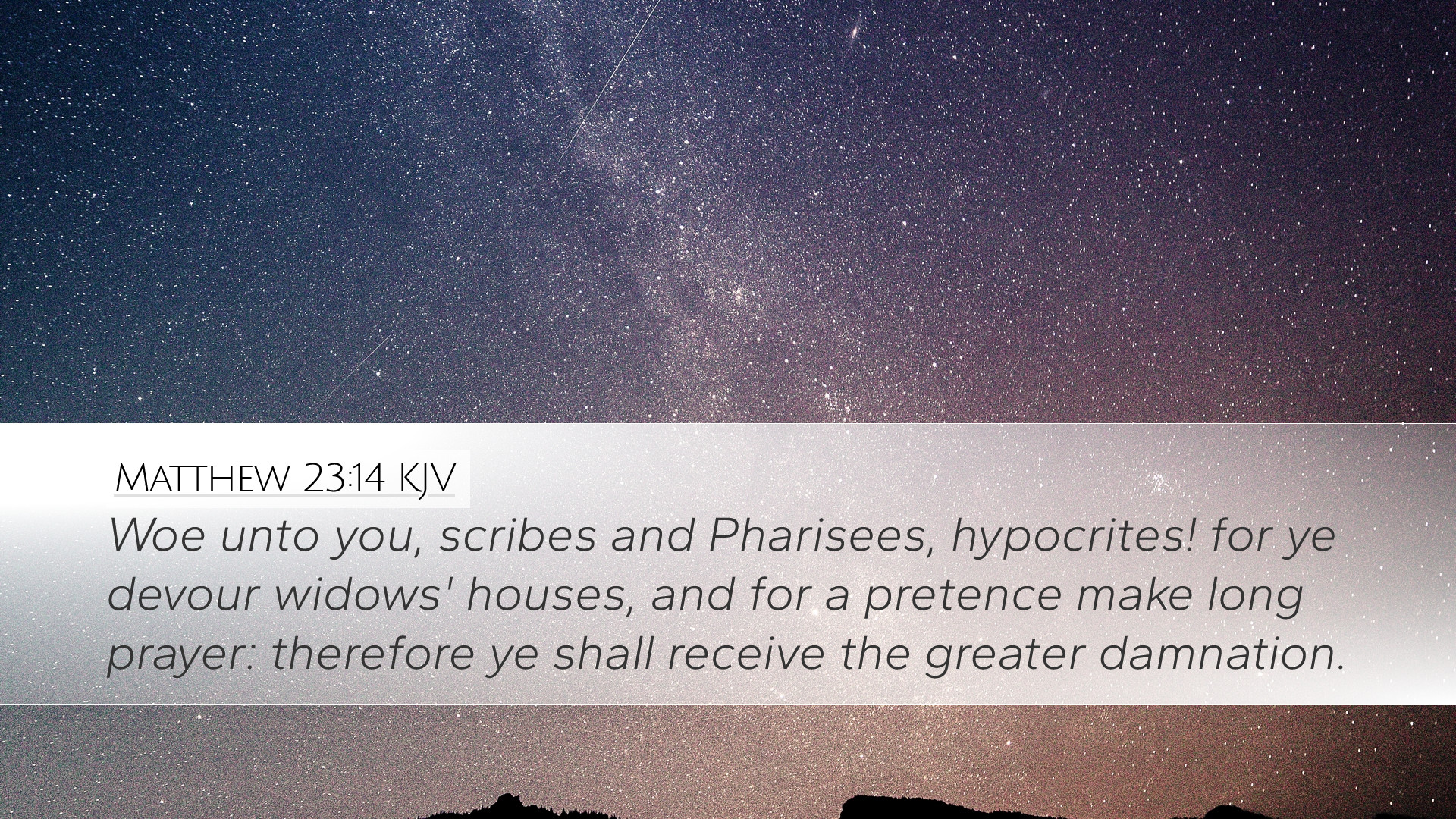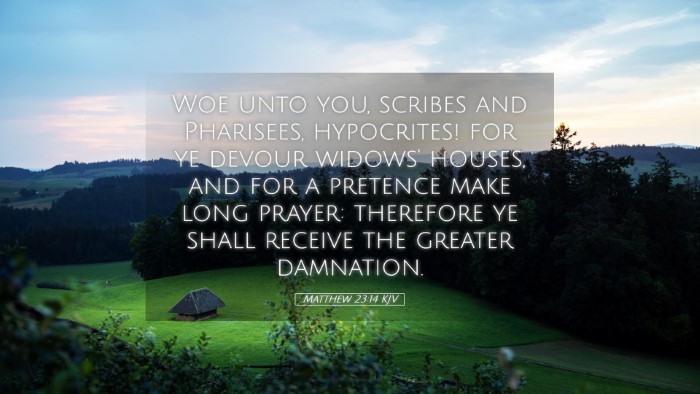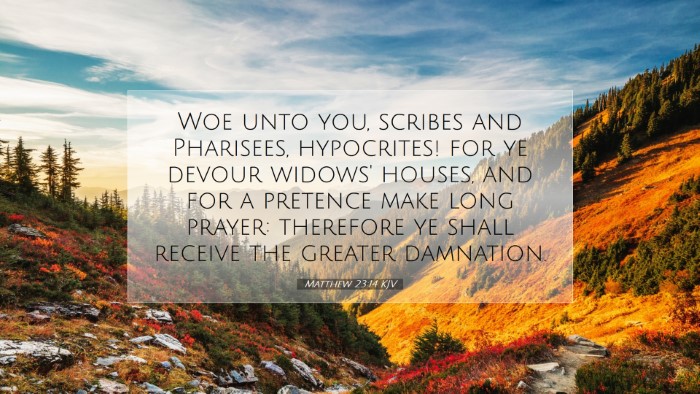Commentary on Matthew 23:14
Bible Verse: "Woe to you, scribes and Pharisees, hypocrites! For you devour widows’ houses, and for a pretense make long prayers. Therefore you will receive greater condemnation."
Context and Background
This verse is part of a longer discourse by Jesus, found in Matthew 23, where He pronounces a series of woes upon the scribes and Pharisees. This chapter details the corruption, hypocrisy, and moral failure of these religious leaders, who were supposed to shepherd the faith of the people but instead exploited them for their gain. Understanding the context in which Jesus speaks is crucial for interpreting His harsh words.
Insights from Public Domain Commentaries
Matthew Henry's Commentary
Matthew Henry emphasizes the severity of Jesus' rebuke against the religious leaders of His time. He notes that the phrase "Woe to you" signifies a pronouncement of judgment—a call to attention regarding their sinful practices. The specific charge of "devouring widows' houses" reveals the exploitation of the most vulnerable members of society, implying that these leaders were abusing their spiritual authority for financial gain. Henry insists that this exploitation was often cloaked in the guise of piety, as the Pharisees engaged in lengthy prayers, which were more about public spectacle than true devotion. This hypocrisy warranted their greater condemnation, as it led others astray and tarnished the image of genuine faith.
Albert Barnes' Notes
Albert Barnes provides a meticulous analysis of the terms used in this verse. He points out the economic and social implications of "devouring widows' houses," indicating that widows—being without protection or support—were particularly susceptible to deceitful practices. Barnes suggests that the long prayers offered by the Pharisees were not sincere pleas but rather performative acts intended to showcase their supposed righteousness. He emphasizes that such hypocrisy leads to greater guilt, as those who pretend to serve God while mistreating others face more severe judgment. This condemnation applies not merely to the Pharisees of Jesus’ time but serves as a warning to all leaders and teachers within the church today.
Adam Clarke's Commentary
Adam Clarke goes deeper into the theological implications of the text. He examines the nature of hypocrisy in religious leadership and its destructive effects on faith communities. Clarke argues that the long prayers, often performed in public, were a means for the Pharisees to elevate their status among the people while neglecting true spiritual engagement with God. Furthermore, he elucidates that "the greater condemnation" alludes to the principle that those in positions of authority bear a heavier responsibility for their actions, particularly when such actions lead others into sin. Clarke's commentary underscores the perpetual relevance of Jesus’ message: leaders must embody the compassion and justice of God, rather than indulge in practices that exploit the vulnerable.
Theological Reflections
This verse serves as a stark reminder of the ethical obligations of those in spiritual authority. The call of Jesus is not merely a historical critique but an enduring challenge for modern-day leaders:
- Responsibility to the Vulnerable: The exploitation of widows not only illustrates a lack of compassion but also a repudiation of God's heart for the marginalized. Leaders must champion justice and protection for the vulnerable today.
- Authenticity in Worship: The length of one's prayers is not indicative of one's spiritual depth. Authenticity must replace performative religiosity, where sincere relationship with God is prioritized over public image.
- Accountability Among Leaders: Those who teach and lead within the church should constantly evaluate their motives and practices, ensuring that they align with the teachings of Christ and serve as examples of His love and righteousness.
Application for Pastors and Students
For pastors and students of theology, understanding the weight of this passage is crucial. It calls for introspection and a commitment to integrity in preaching and practice. Some practical applications include:
- Engaging with the Marginalized: Actively seek ways to support and uplift the disenfranchised within your community, ensuring that your ministry reflects God’s love for all people.
- Evaluating Personal and Corporate Worship: Encourage a culture of genuine prayer and worship that prioritizes heart over appearance. Foster environments where all can communicate freely with God.
- Establishing Accountability Structures: Create systems within your church that promote transparency and accountability, allowing leaders to be held responsible for their actions and decisions.
Conclusion
In Matthew 23:14, Jesus does not mince words. He lays bare the consequences of hypocrisy and the exploitation that can arise when religious authority is misused. The insights drawn from the commentaries of Matthew Henry, Albert Barnes, and Adam Clarke illuminate the enduring truth of this passage, encouraging a commitment to compassion, authenticity, and accountability among those who lead in faith. The call to examine our practices and motives is as relevant today as it was in Jesus’ time, making this verse a critical touchstone for theological reflection and practical ministry.


